专四语法点
专四语法
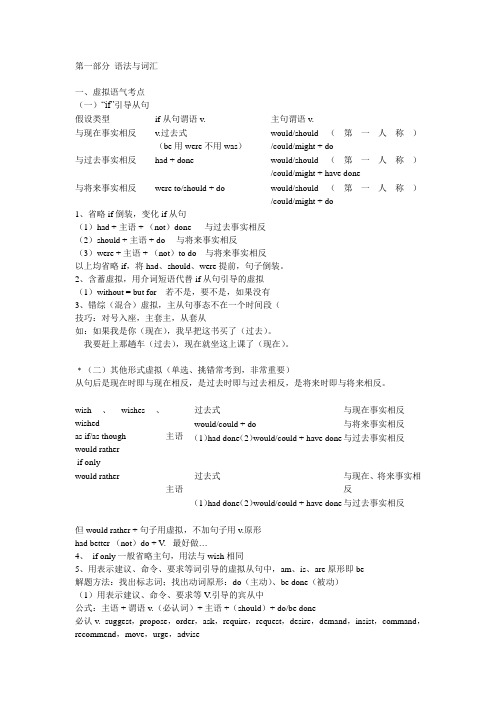
第一部分语法与词汇一、虚拟语气考点(一)“if”引导从句假设类型if从句谓语v. 主句谓语v.与现在事实相反v.过去式(be用were不用was)would/should(第一人称)/could/might + do与过去事实相反had + done would/should(第一人称)/could/might + have done与将来事实相反were to/should + do would/should(第一人称)/could/might + do1、省略if倒装,变化if从句(1)had + 主语 + (not)done 与过去事实相反(2)should + 主语 + do 与将来事实相反(3)were + 主语 + (not)to do 与将来事实相反以上均省略if,将had、should、were提前,句子倒装。
2、含蓄虚拟,用介词短语代替if从句引导的虚拟(1)without = but for 若不是,要不是,如果没有3、错综(混合)虚拟,主从句事态不在一个时间段(技巧:对号入座,主套主,从套从如:如果我是你(现在),我早把这书买了(过去)。
我要赶上那趟车(过去),现在就坐这上课了(现在)。
﹡(二)其他形式虚拟(单选、挑错常考到,非常重要)从句后是现在时即与现在相反,是过去时即与过去相反,是将来时即与将来相反。
wish、wishes、wishedas if/as though would rather if only 主语过去式与现在事实相反would/could + do 与将来事实相反(1)had done(2)would/could + have done 与过去事实相反would rather主语过去式与现在、将来事实相反(1)had done(2)would/could + have done 与过去事实相反但would rather + 句子用虚拟,不加句子用v.原形had better (not)do + V. 最好做…4、 if only 一般省略主句,用法与wish相同5、用表示建议、命令、要求等词引导的虚拟从句中,am、is、are原形即be解题方法:找出标志词;找出动词原形:do(主动)、be done(被动)(1)用表示建议、命令、要求等V.引导的宾从中公式:主语 + 谓语v.(必认词)+ 主语 +(should)+ do/be done必认v. suggest,propose,order,ask,require,request,desire,demand,insist,command,recommend,move,urge,advise(2)用于与建议、命令、要求等V.意义类似的形容词所引导的从句公式:It is + adj. (必认词)+ that + 主语 +(should)+ do/be done必认adj. suggested,proposed,ordered,asked,required,requested,desired(desirable),demanded,commanded,recommended,urgent,advisable,important,vital,essential,necessary, imperative(3)与表示建议、命令、要求等v.相类似的n.引导的表语从句和同位语从句表从公式:主语 + 系词 + that + 主语(should) + do/be done同位从公式:n. + that + 主语(should)+ do/be done必认n. suggestion,proposal,order,requirement,request,desire,demand,insistence,requirement,request,desire,demand,insistence,motion,recommendation,advice6、 It's/was/ + time + that + 主语 + did(过去式)早该到…的时间了/high time/about time7、跳层虚拟公式:真实,otherwise / or + 虚拟虚拟,but + 真实(一般考过去时)特点:真实——过去时或 must have done,对过去肯定猜测虚拟——would / could + have done(三)情态v. + have done ,表示对过去事情的推测must + have done 肯定,没有musn't(表禁止…)could + have done 本能够,可能做(但未做)may + have done 本可能,或许might + have done 本可能should = ought to + have done 本应做,而未做(含责备)shouldn't = oughtn't to + have done 本不应做而做了(含责备)needn't + have done 没有必要做而做了(无责备)need 情态v.“必要” + v.实义v.“需要” + need doing(形式主动,实际被动) = need to be done“需要”need + to do二、非谓语动词(一)不定式: to do / not to do1、形式(时态/语态), vt.(vi.只有主动)基本形式:主动被动﹡一般式to do to be done﹡完成式to have done to have been done进行式to be doing ×完成进行式to have been doing ×注意:不定式的一般式表示动作与主句的动作将要发生或同时发生,而不定式的完成式表示动作要先于主句的动作前发生,不定式的完成式不能作定语。
完整版专四英语语法考点分析解析
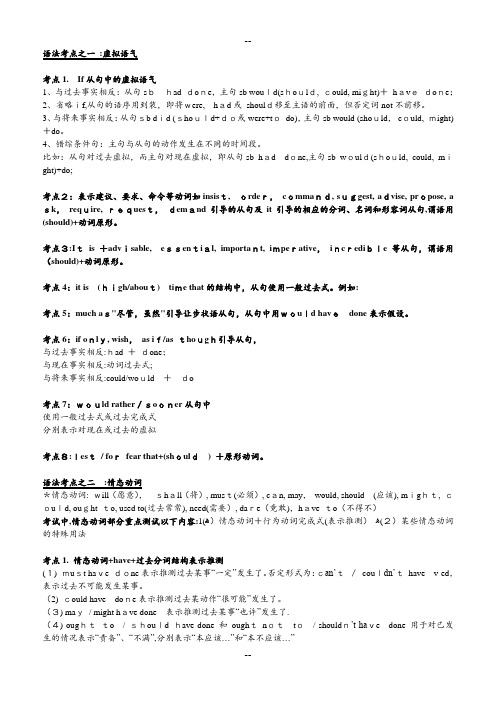
语法考点之一:虚拟语气考点1.If从句中的虚拟语气1、与过去事实相反:从句sbhad done,主句sb would(should, could, might)+havedone;2、省略if,从句的语序用到装,即将were,had或should移至主语的前面,但否定词not不前移。
3、与将来事实相反:从句sb did (should+do或were+todo),主句sb would (should,could, might)+do。
4、错综条件句:主句与从句的动作发生在不同的时间段。
比如:从句对过去虚拟,而主句对现在虚拟,即从句sb had done,主句sb would(should, could, might)+do;考点2:表示建议、要求、命令等动词如insist,order,command, suggest, advise, propose, a sk,require, request,demand引导的从句及it引导的相应的分词、名词和形容词从句,谓语用(should)+动词原形。
考点3:Itis +advisable,essential, important, imperative,incredible等从句,谓语用(should)+动词原形。
考点4:it is(high/about)time that的结构中,从句使用一般过去式。
例如:考点5:much as"尽管,虽然"引导让步状语从句,从句中用would havedone表示假设。
考点6:if only, wish,as if/as though引导从句,与过去事实相反:had +done;与现在事实相反:动词过去式;与将来事实相反:could/would+do考点7:would rather/sooner从句中使用一般过去式或过去完成式分别表示对现在或过去的虚拟考点8:lest/ forfear that+(should) +原形动词。
专四常考语法点汇总定稿版

专四常考语法点汇总精编W O R D版IBM system office room 【A0816H-A0912AAAHH-GX8Q8-GNTHHJ8】语法与词汇专项语法核心考点一:从属分句复合句= 主句+从句(1个或1个以上)要点1从属分句是复合句必不可少的组成部分,以语法功能作为分类标准,从属分句可以分为状语从句、关系从句(即定语从句)和名词性从句。
其中状语从句可分为时间、地点、原因、结果、程度、目的、条件、让步和方式等;名词性从句可分为主语从句、宾语从句、表语从句、同位语从句。
要点2 状语从句的考点集中在方式、条件、让步、方式和时间状语从句上;关系从句的考点集中在关系代词的选择,限制性定语从句和非限制性定语从句的区别;名词性从句的考点集中在宾语从句和同位语从句。
一状语从句状语从句真题剖析:1 Nine is to three _____ three is to one. (2008, 53)A. whenB. thatC. whichD. what2 ______ he wanted to go out with his friends at the weekend, he had to stay behind to finish his assignment. (2008, 55)A. Much thoughB. Much asC. As muchD. Thouth much3 Men differ from animals ____ they can think and speak. (2008, 54)A. for whichB. for thatC. in thatD. in which4 They stood chatting together as easily and naturally as ____. (2008, 60)A. it could beB. could beC. it wasD. was5 The couple had no sooner got to the station ______ the coach left. (2009,60)A. whenB. asC. untilD. than6 ____ the boss says, it is unreasonable to ask me to work overtime without pay. (2010,55)A. WhateverB. WheneverC. WhicheverD. However7 Fool ____ Jerry is, he could not have done such a thing.A. whoB. asC. likeD. that8 He asked me to lend him some money, which I agreed to do, ___ that he paid me back the following week. (2005)A. on occasionB. on purposeC. on conditionD. only if9 Which of the following contains an adverbial clause of cause?A. I got a job as soon as I left university.B. As there was on answer, I wrote again.C. You must do the exercise as I show you.D. Wealthy as he is, Mark is not a happy man.状语从句重点总结:(一)条件状语从句:表示条件或假设,通常由以下连词或结构引导:★特别提醒几种不常用的条件状语从句举例:In the event that she can not arrive on time, we will go first. Suppose it snowed, we would still go.Say what he said were true, what would you do about it?(二)让步状语从句:含有“虽然,尽管,即使”之意,主要引导词有:★特别提醒1. 几种不常用的让步状语从句举例:In spite of the fact that he was deaf and dumb, he had a genius for music. While the grandparents love the children, they are strict with them.Much as she needed the job, she had to refuse.For all that there were a lot of difficulties, he finally entered the final competition and won.Granted you have made much progress, you should not be conceited.2. 用了although或though,就一定不能再后面的从句中同时用but,但是though可以和yet 连用。
英语专四语法复习内容

英语专四语法复习内容想要通过英语专四考试,就必须掌握英语专四的语法。
那么英语专四的语法有哪些呢?下面由店铺为大家整理的英语专四语法内容,希望大家喜欢!英语专四语法内容一 There be 结构1. There be结构There were very few people left when we got there.There have been many such incidents.Nearby there had been a fight in full progress.也可以是情态动词 +beThere can be very little doubt about his guilt.There may always be instances about which we are uncertain. There ought to / should be some instructions on the lid.还可以是There +情态动词+ be 的完成时There may have been an accident.If the criminal had come this way, there would be / would have been footprints. There should / ought to have been someone on duty all the time.2. There + 半动词+ be,这里很少用完成体形式.There is certain to be trouble at the factory.There is sure / likely to be some rain tonight. There seems / appears to be no doubt about it.3. There be结构也可有被动式,这类there be结构有些可以与there be结构的一般形式相互转换。
英语专四语法考点总结
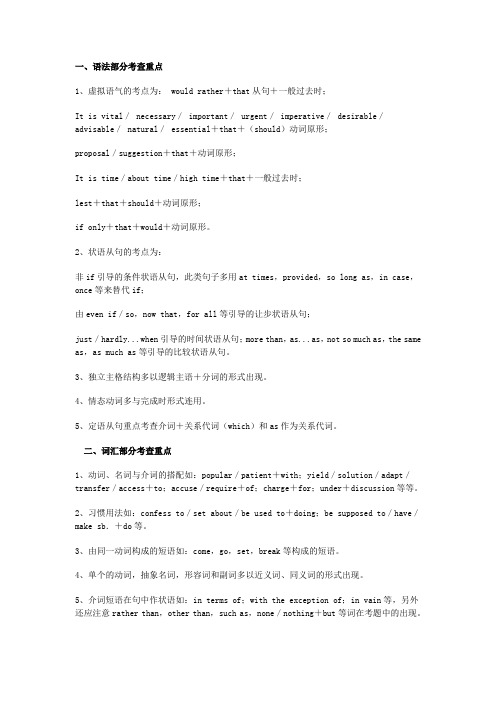
一、语法部分考查重点1、虚拟语气的考点为: would rather+that从句+一般过去时;It is vital/ necessary/ important/ urgent/ imperative/ desirable/advisable/ natural/ essential+that+(should)动词原形;proposal/suggestion+that+动词原形;It is time/about time/high time+that+一般过去时;lest+that+should+动词原形;if only+that+would+动词原形。
2、状语从句的考点为:非if引导的条件状语从句,此类句子多用at times,provided,so long as,in case,once等来替代if;由even if/so,now that,for all等引导的让步状语从句;just/hardly...when引导的时间状语从句;more than,as...as,not so much as,the same as,as much as等引导的比较状语从句。
3、独立主格结构多以逻辑主语+分词的形式出现。
4、情态动词多与完成时形式连用。
5、定语从句重点考查介词+关系代词(which)和as作为关系代词。
二、词汇部分考查重点1、动词、名词与介词的搭配如:popular/patient+with;yield/solution/adapt/transfer/access+to;accuse/require+of;charge+for;under+discussion等等。
2、习惯用法如:confess to/set about/be used to+doing;be supposed to/have/make sb.+do等。
3、由同一动词构成的短语如:come,go,set,break等构成的短语。
专四词汇与语法
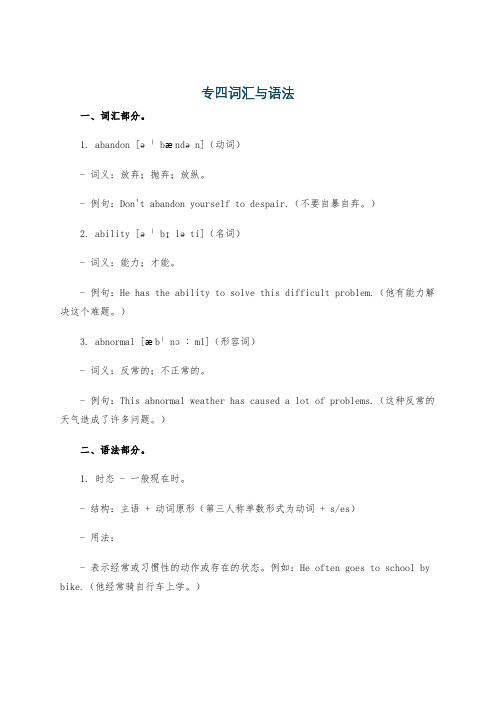
专四词汇与语法一、词汇部分。
1. abandon [əˈbændən](动词)- 词义:放弃;抛弃;放纵。
- 例句:Don't abandon yourself to despair.(不要自暴自弃。
)2. ability [əˈbɪləti](名词)- 词义:能力;才能。
- 例句:He has the ability to solve this difficult problem.(他有能力解决这个难题。
)3. abnormal [æbˈnɔːml](形容词)- 词义:反常的;不正常的。
- 例句:This abnormal weather has caused a lot of problems.(这种反常的天气造成了许多问题。
)二、语法部分。
1. 时态 - 一般现在时。
- 结构:主语 + 动词原形(第三人称单数形式为动词 + s/es)- 用法:- 表示经常或习惯性的动作或存在的状态。
例如:He often goes to school by bike.(他经常骑自行车上学。
)- 表示客观事实或普遍真理。
例如:The earth moves around the sun.(地球绕着太阳转。
)2. 名词的数 - 可数名词复数形式。
- 规则变化:- 一般情况加 -s,如book - books。
- 以s, x, ch, sh结尾的加 -es,如box - boxes。
- 以辅音字母 + y结尾的,变y为i加 -es,如city - cities。
- 不规则变化:- 如man - men,woman - women,child - children等。
3. 形容词和副词的比较级和最高级。
- 规则变化:- 单音节词和部分双音节词:- 一般情况加 -er(比较级)和 -est(最高级),如tall - taller - tallest。
- 以e结尾的加 -r和 -st,如nice - nicer - nicest。
专四常考语法点
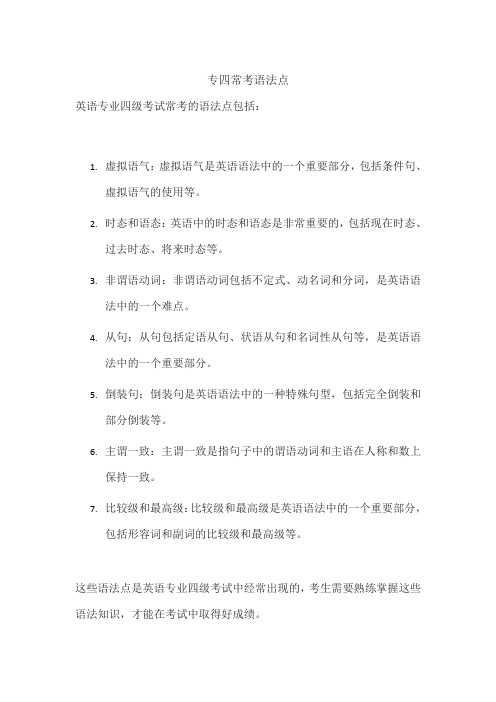
专四常考语法点
英语专业四级考试常考的语法点包括:
1.虚拟语气:虚拟语气是英语语法中的一个重要部分,包括条件句、
虚拟语气的使用等。
2.时态和语态:英语中的时态和语态是非常重要的,包括现在时态、
过去时态、将来时态等。
3.非谓语动词:非谓语动词包括不定式、动名词和分词,是英语语
法中的一个难点。
4.从句:从句包括定语从句、状语从句和名词性从句等,是英语语
法中的一个重要部分。
5.倒装句:倒装句是英语语法中的一种特殊句型,包括完全倒装和
部分倒装等。
6.主谓一致:主谓一致是指句子中的谓语动词和主语在人称和数上
保持一致。
7.比较级和最高级:比较级和最高级是英语语法中的一个重要部分,
包括形容词和副词的比较级和最高级等。
这些语法点是英语专业四级考试中经常出现的,考生需要熟练掌握这些语法知识,才能在考试中取得好成绩。
专四语法常见考点
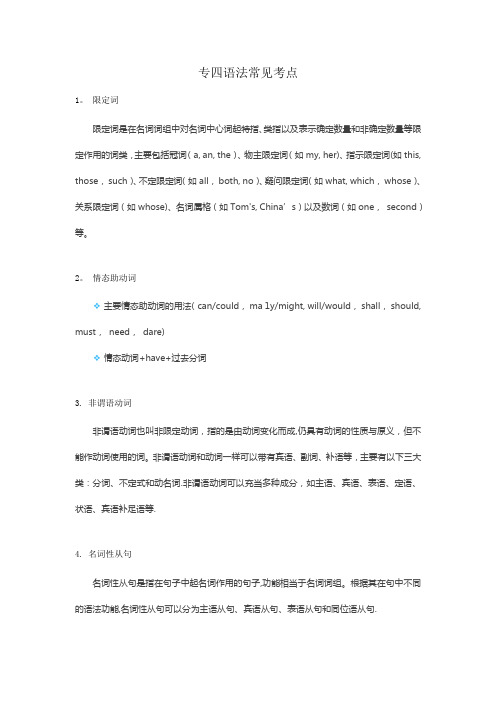
专四语法常见考点1。
限定词限定词是在名词词组中对名词中心词起特指、类指以及表示确定数量和非确定数量等限定作用的词类,主要包括冠词(a, an, the)、物主限定词(如my, her)、指示限定词(如this, those,such)、不定限定词(如all,both, no)、疑问限定词(如what, which,whose)、关系限定词(如whose)、名词属格(如Tom's, China’s)以及数词(如one,second)等。
2。
情态助动词❖主要情态助动词的用法(can/could,ma 1y/might, will/would,shall,should, must,need,dare)❖情态动词+have+过去分词3. 非谓语动词非谓语动词也叫非限定动词,指的是由动词变化而成,仍具有动词的性质与原义,但不能作动词使用的词。
非谓语动词和动词一样可以带有宾语、副词、补语等,主要有以下三大类:分词、不定式和动名词.非谓语动词可以充当多种成分,如主语、宾语、表语、定语、状语、宾语补足语等.4. 名词性从句名词性从句是指在句子中起名词作用的句子,功能相当于名词词组。
根据其在句中不同的语法功能,名词性从句可以分为主语从句、宾语从句、表语从句和同位语从句.5. 定语从句❖定语从句就是修饰名词或代词的从句,通常在被修饰词的后面,本质上相当于形容词的作用.被修饰的名词或代词叫做先行词。
❖定语从句分为限制性定语从句和非限制性定语从句。
限制性定语从句是先行词不可或缺的部分,去掉后主句意思往往不明确;非限制性定语从句是先行词的附加说明,去掉了也不会影响主句的意思,它与主句之间通常用逗号分开。
6。
状语从句如果一个从句用作状语,功能相当于副词并修饰动词、形容词或整个句子,那么该从句就是状语从句。
根据其作用,状语从句可分为时间、地点、条件、原因、让步、方式、比较、目的、结果等状语从句。
7。
时态与语态❖时态.英语主要的时态有12种,分别是:一般现在时,现在进行时,现在完成时,现在完成进行时;一般过去时,过去进行时,过去完成时,过去完成进行时;一般将来时,将来进行时,将来完成时,将来完成进行时。
- 1、下载文档前请自行甄别文档内容的完整性,平台不提供额外的编辑、内容补充、找答案等附加服务。
- 2、"仅部分预览"的文档,不可在线预览部分如存在完整性等问题,可反馈申请退款(可完整预览的文档不适用该条件!)。
- 3、如文档侵犯您的权益,请联系客服反馈,我们会尽快为您处理(人工客服工作时间:9:00-18:30)。
专四语法总结(13)十五、复合句——副词性(状语)从句副词在句中起状语作用,故如果起状语作用的部分为一个句子,那么该句便是副词性从句,也称状语从句。
状语从句可细分为:时间、地点、条件、原因、让步、目的、结果、比较、方式等。
状语从句的测试重点为:考查考生对主从句之间逻辑意义关系的把握,看其是否能选择正确的从属连词。
1.条件状语从句的常考知识点(1)if与unless的用法。
if和unless都是引导条件状语从句的连词,考生应尤其注意unless的用法,因为它表示反面条件,相当于if not“如果不”、“除非”。
如:In debating, one must correct the opponent’s facts, deny the relevance of his proof, or deny that what he presents as proof, if relevant, is sufficient.(2)复合连词as long as,so long as,as far as,on condition that,in the event that;动词及分词provided(that),providing(that),given that, suppose/supposing(that),assuming,say等引导条件状语从句。
如:You can arrive in Beijing earlier for the meeting provided you don’t mind taking the night train.Assuming he is diligent in his studies at ordinary times, he is sure to pass the test.In the event that she has not been informed, I will tellher. (如果……)You can go swimming on condition that you don’t go too farfrom the river bank. (如果……)Suppose it rained, we would still go. (假如……) Say it were true, what would you do about it? (假如……)(3)祈使句表示条件。
如:Dress warmly, or else you’ll catchcold.Talk to anyone in the drug industry, and you’ll soon discover that the science of genetics is the biggest thingto hit drug research since penicillin was discovered.2.让步状语从句的常考知识点(1)as 引导让步从句,要求用倒装结构,把强调的部分置于句首。
如: Much as he likes her, he does get irritated with her sometimes.Humble as it may be, there is no place like home.(2)while引导让步从句。
如:Everybody cheats a little, some psychologists say, whileothers insist that most people are basically honest andsome wouldn’t cheat under any circumstances.(3)复合连接词for all that和分词granting/granted(that)引导让步从句。
如:Granted you have made much progress, you should not be conceited.For all that computers can provide us with great help, they shouldn’t be seen as substitutes for fundamental thinking and reasoning skills.十四、复合句——名词性从句一个句子起名词的作用,在句中做主语、宾语/介词宾语、表语、同位语,那么这个句子就是名词性从句。
1.what/whatever的用法考生应把握:what是关系代词,它起着引导从句并在从句中担当一个成分这两个作用。
如:They lost their way in the forest, and what made matters worse was that night began to fall.(what既引导主语从句又在从句中做主语)Water will continue to be what it is today—next in importance to oxygen. (what既引导表语从句又在从句中做表语)2.whoever和whomever的区别whoever和whomever相当于anyone who,用主格与宾格取决于其在从句中做主语还是做宾语。
如:They always give the vacant seats to whoever comes first. (whoever在从句中做主语)3.有关同位语从句的问题(1)引导词通常为that, 但有时因名词内容的需要,也可由whether及连接副词why, when, where, how引导。
that不表示任何意义,其他词表示时间、地点、原因等。
如: The problem, where I will have my college education, at home or abroad, remains untouched.(2)同位语从句有时与先行词隔开,注意识别。
如:Evidence came up that specific speech sounds are recognized by babies as young as 6 months old.4.whether与if在引导名词性从句时的区别(1)主语从句只能用whether引导;(2)whether一般多用于宾语从句的肯定式,而if引导的从句可以有否定式;(3)whether or not可以连在一起用,而if or not则不能,or not只能放在句末;(4)whether可以引导介词宾语从句,if则不能;(5)宾语从句提至谓语前面时,只能用whether引导;(6)在question, ask后面一般只用whether,question的同位语从句也用whether引导;(7)后接不定式时,只能用whether。
5.动词believe, expect, fancy, imagine, suppose, think 后的宾语从句如为否定式,一般将否定词转移到主句谓语上。
十三、复合句——形容词性(定语)从句1.尤其要注意whose的用法whose在从句中做定语,修饰名词。
所以,如果关系代词后面紧接的是名词,且关系代词又不在从句中做主语或宾语,那么,这个关系代词就应该是whose。
如:He is the right person whose personality is well recognized.2.介词 +which的用法如果从句中主宾成分齐全,考生便可考虑关系代词是否在从句中做状语,而状语通常用介词短语充当,于是可以得知,关系代词前面应有介词,再分析所给的选项,根据与名词的搭配作出正确选择。
如:We are not conscious of the extent to which work provides the psychological satisfaction that can make the difference between a full and an empty life.3.as 与which用作关系代词的区别(1)as与the same, such, so, as等关联使用。
如:As the forest goes, so goes its animal life.(2)as和which都可以引导非限定性定语从句,但as在句中的位置比较灵活,可出现在句首、句中、句末,而which只能出现在句末,尤其是当先行词是整个句子时。
如:As is true in all institutions, juries are capable of making mistakes.As is generally accepted, economic growth is determined bythe smooth development of production.常见的这类结构有:as has been said before, as has been mentioned above, as can be imagined, as is known to all, as has been announced, as can be seen from these figures, as might/could be expected, as is often the case, as has been pointed out, as often happens, as will be shown等。
4.关系代词that与which用于引导定语从句的区别(1)如果关系代词在从句中做宾语,用that, which都可以,而且可以省略;(2)先行词是不定代词anything, nothing, little, all, everything时,关系代词用that;(3)先行词由形容词最高级或序数词修饰或由next,last, only, very修饰时,用that;(4)非限定性定语从句只能用which引导;(5)关系代词前面如果有介词,只能用which。
5.but做关系代词,用于否定句,相当于who…not, that…not这个结构的特点是主句中常有否定词或含有否定意义的词。
如:There are few teachers but know how to use a computer. There is no complicated problem but can be solved by a computer.十一、主谓一致问题1.主语与谓语之间有定语从句或其他结构修饰,所以距离较远,考生易误认主语。
